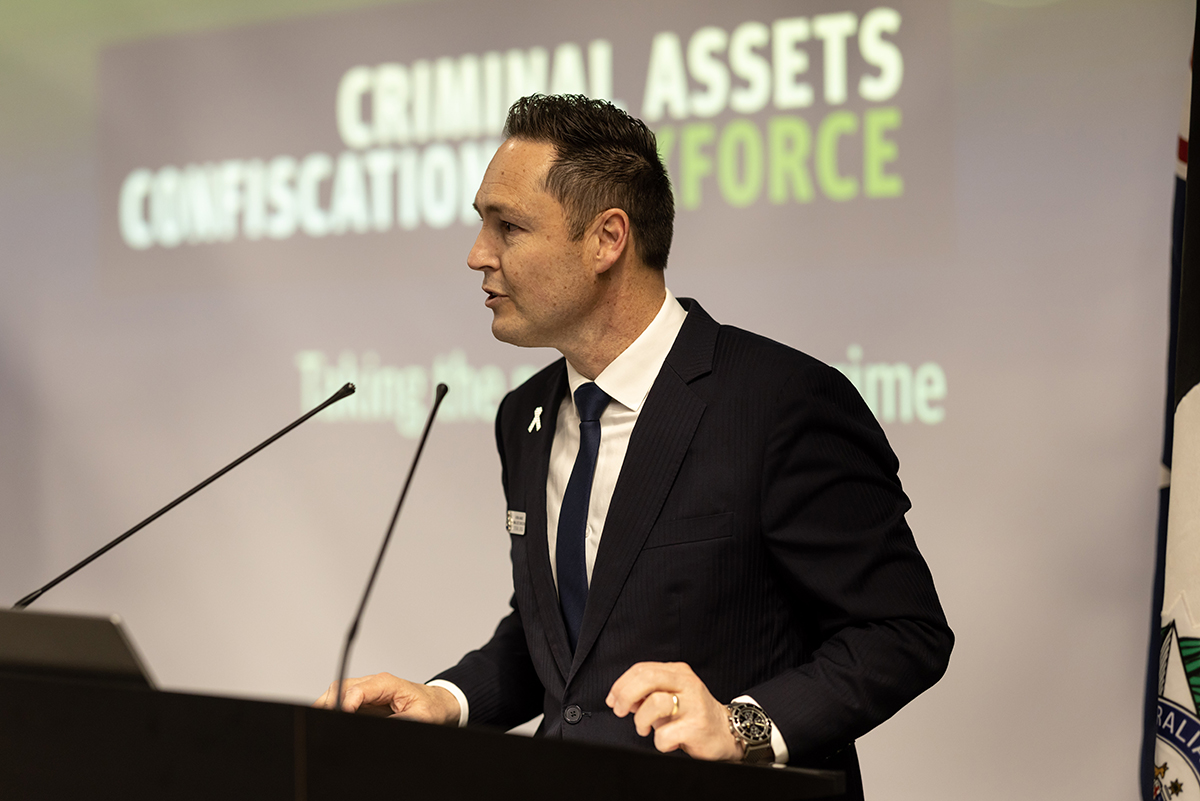Australia’s specialised crypto unit: insights for law enforcement

As the use of cryptocurrencies and other virtual assets expands and evolves, so does their misuse to commit crimes and launder money. How can law enforcement best respond?
This short interview with Stefan Jerga of the Australian Federal Police gives some practical insights to other law enforcement agencies seeking to build and streamline their crypto capabilities.
Stefan Jerga is National Manager of the AFP’s Criminal Assets Confiscation Taskforce and leader of its dedicated crypto capabilities team, which was established in 2020. He spoke with Federico Paesano, who leads the Basel Institute’s efforts to build crypto capacity among law enforcement partners.
Why do law enforcement agencies need specialised crypto capacity?
The fast-evolving use of crypto assets to commit crimes and launder money is a prime example of how the criminal environment is constantly changing, explained Stefan. Law enforcement needs to continuously adapt to protect law-abiding citizens from emerging threats, including
“the “99 percent of people who are using cryptocurrencies for lawful reasons.”
Though the exact amount of criminal activity involving crypto assets is hard to estimate, Stefan said he and his colleagues were
“seeing enough to know that we had to raise our capabilities in this area.”
Recent illustrative cases include a seizure of over AUD 10 million in assets, including cryptocurrencies, in an international money laundering investigation, and a scheme to pay tens of thousands of AUD into cash machines at night before a fast transfer into cryptocurrency. A significant amount of cryptocurrency is among the more than AUD 600 million in criminal assets that the AFP's Criminal Assets Confiscation Taskforce seized from July 2019 to September 2022.
And why a dedicated crypto unit?
Before the formal establishment of the cryptocurrency capabilities team in September 2020, officers from across the AFP with disparate crypto expertise met regularly as an informal cross-agency group.
This provided a valuable space to exchange experiences and support different areas of the AFP in crimes involving cryptocurrencies. It could be a good starting point for law enforcement agencies just starting to address crypto. However, Stefan says that
“setting up a specialised team has allowed us to build more powerful capabilities and provide more targeted support across our organisation.”
The cross-agency aspect is vital because cryptocurrency can appear in many different crime types, from drug and weapons trafficking to child exploitation and illegal gambling. There is certainly a strong synergy between crypto and cybercrimes such as online scams, hacks and fraud schemes. But
“the use of cryptocurrencies goes well beyond the cyber sphere and can impact any part of the organisation.”
What does the crypto team do?
The team’s focus includes training, supporting investigations and identifying crypto for potential asset seizure.
“Cryptocurrencies and other blockchain-based technologies can provide important evidence and information to support cases, as well as open up more opportunities to seize criminal assets.”
The team members can also support prosecutions with their specialist expertise, such as explaining evidence from blockchain analysis.
As a dedicated unit, the crypto capabilities team also takes on a more proactive and structured role in raising awareness and crypto ‘literacy’ among all officers. While not every officer needs specialised skills, it is important for a broad range of law enforcement officers to have a basic understanding of crypto assets and crime. Officers conducting a house search as part of a drugs investigation, for example, should have the knowledge to spot signs that a suspect holds crypto assets, and know what to do with that information.
Training and awareness raising efforts span the whole organisation, from new recruits to experienced detectives.
How does the team support private-sector and international cooperation?
Cryptocurrencies can move extremely fast between different virtual asset service providers and is “basically borderless”. The dedicated crypto team therefore supports fast and efficient cooperation with both private-sector entities and international law enforcement counterparts.
At the international level, the need for speed means
“it is important to maximise use of informal cooperation channels, including the channels that Europol and Interpol provide.”
When it comes to the private sector,
“the vast majority of exchanges and other virtual asset service providers are lawful, regulated businesses and have no interest in facilitating crime or money laundering.”
A 2021 case of money laundering linked to identity theft, for example, was triggered by a cryptocurrency exchange proactively sending a suspicious transaction report to the authorities.
Having a dedicated crypto team helps to build and maintain constructive relationships with such service providers. Private-sector firms also provide powerful software tools for law enforcement to analyse blockchains and extract information and evidence.
What skills and tools are needed?
The team, which now has eight full-time members, encompasses a variety of skills and knowledge, beyond a deep understanding of the technical aspects of blockchains and crypto assets and an ability to use software tools. Skill sets range from investigations and asset recovery to digital forensics and, most recently, crypto forensic accounting.
How does one recruit for a crypto team?
“The crypto field is still emerging and remains in constant evolution, so existing formal qualifications are rare. The first thing we look for is interest in crypto and a curiosity to learn more.”
A combination of structured training and on-the-job learning and mentoring help new team members to quickly upskill. The AFP also proactively shares experiences with law enforcement counterparts overseas at international meetings, for example at the recent Global Conference on Criminal Finances and Cryptocurrencies organised by Europol and the Basel Institute on Governance.
Any words for fellow law enforcement?
“Crypto is not going away, and is an important capability for law enforcement to acquire.
We have found our specialised unit extremely valuable in many ways, but other setups exist depending on resources and how the organisation is structured. My advice is not to overthink things, but make a start and build your capabilities around curious and passionate people.”
- Stefan Jerga


